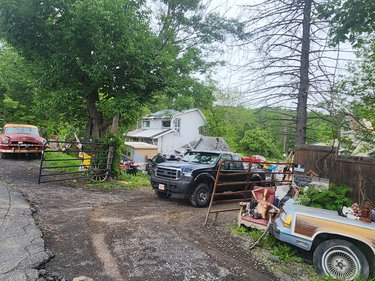Knox neighbors plead with town board to take action on ‘junkyard’ property
KNOX — More than six months after Knox resident Amber Fillipone says she first brought the matter to officials’ attention, she and several of her neighbors spoke up at a town board meeting this month to plead with the board to take action on what Fillipone says is a “junkyard” property on Bozenkill Road.
The property is co-owned by town board member June Springer, who said during the July 8 meeting that she does not live there and that the property is primarily owned by her son, Jeremy Springer. She also said she was unaware of any issues there until she was shown the first violation notice in June.
The town assessment roll lists both June and Jeremy Springer as owners and says the single-family home on one acre at 510 Bozenkill Road has a full market value of $189,189.
As seen from the road this week, the residential property is littered with damaged and rusted-out miscellanea. Photos shared with The Enterprise by Fillipone that she had taken earlier in the year show that some of the debris — including what appear to have been broken-down vehicles, one of which had a crude, four-letter word spray-painted on it — has been removed.
Fillipone said that she had first spoken with Knox Supervisor Russ Pokorny as early as November about her concerns with the property, but had not seen any improvements for many months.
She also claimed that there appears to be no running water on the property since on multiple occasions, a young woman living at the property had come to her door asking for water.
New York State Property Maintenance Code requires occupied buildings to have running water, except in cases where a single-family residence occupied by the owner has approval from a building official.
The Enterprise has not been able to reach either of the Springers nor the Knox building department — comprising code enforcement officer Richard Loucks and building inspector Dan Sherman — for more information.
At the time Fillipone took the photos she shared with The Enterprise, the property did appear to meet the definition of a junkyard under Knox Zoning Ordinance, which states that “outside storage of two or more junk motor vehicles for more than thirty days shall constitute a Junk Yard.”
The definition also includes “waste paper, waste rags, scrap metal, plastic or building materials, scrap construction materials of any kind, scrap road paving materials of any kind, [and] discarded appliances of any kind.”
At the meeting, June Springer told the board and residents in the gallery that Jeremy had purchased the property in March of 2020 and rented it out, but COVID-era regulations prevented him from kicking out problematic tenants.
“Once the house was vacated, he realized the extent of the damage done,” she said, adding that it has been “an upwards battle since.”
Springer said the items on the property were for Jeremy’s “own use,” and that the broken-down vehicles had once been in working order.
She said it is “being addressed and will be taken care of, as time permits, in short order.”
Springer went on to indirectly criticize Pokorny for not bringing it to the board’s attention sooner, saying that she was “confident that this matter could have [been] handled” sooner.
Pokorny is a Democrat while the other board members are Republican-backed.
Springer denied that she could have committed any ethics violation, as Fillipone had alleged, arguing that she could not have done anything about a situation she did not know about.
Pokorny told The Enterprise this week he was confident that there had not been any favoritism toward the Springers.
“I would discount that entirely,” he said. “It could work the other way, in fact, because it’s June’s property, everyone’s paying more attention to it.”
The zoning enforcement process is slow, he said, and hasn’t worked “any more quickly” for other properties than this one.
“They’re proceeding along the procedural lines, sending out letters and enforcing them with the same kind of strength,” Pokorny said.
For motor-vehicle removal, for instance, a resident becomes eligible for a violation once non-working vehicles have been on a property for 30 days. At that point, the enforcement officer serves a written notice of the violation, and the resident has 25 days to prove there is no violation.
Failing that, the code-enforcement officer serves an official violation, ordering the vehicles to be removed within 30 days.
Pokorny said he understands that many people feel they should be able to do whatever they wish with the properties they own, but he still thinks zoning laws are necessary and need to be enforced because “unfortunately, we need some protection from each other, I think.”



